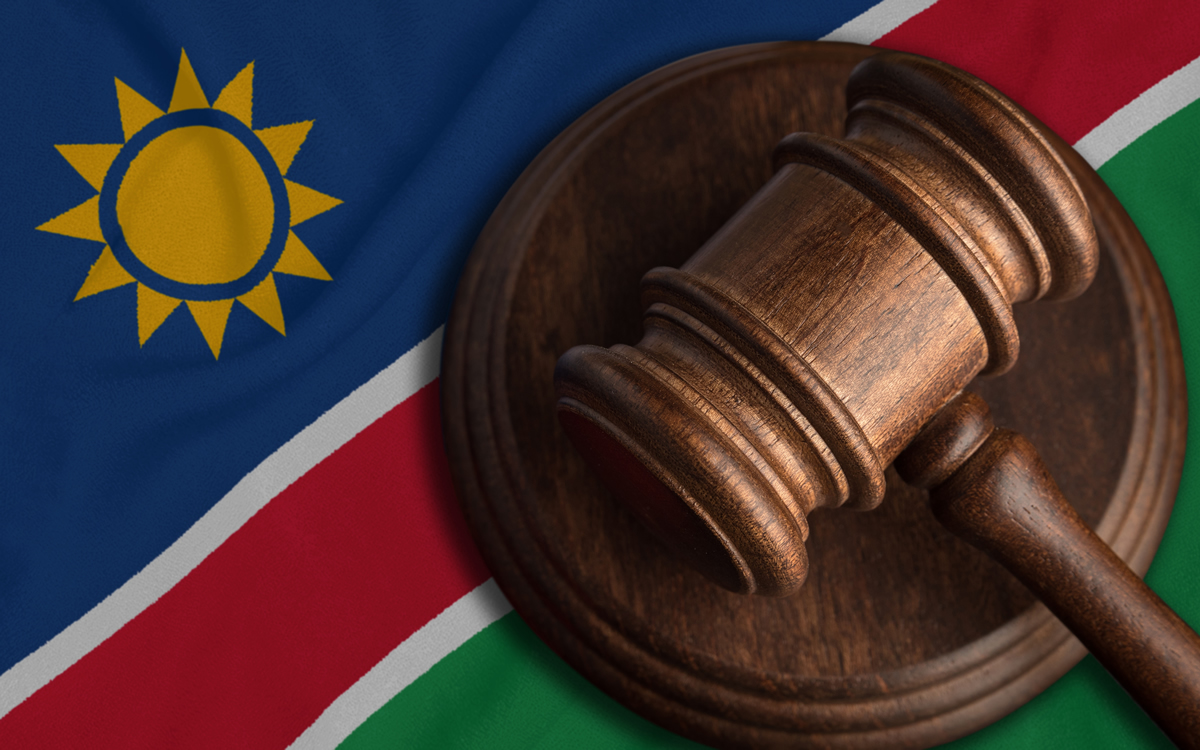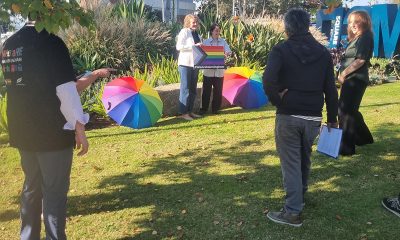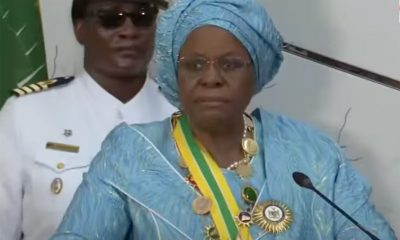Africa
Namibia Supreme Court grants partial victory to gay couple seeking permanent residency
Men’s attorney says many hurdles remain

A married same-sex couple who is seeking permanent residency in Namibia received a partial victory from the country’s Supreme Court last week
The Supreme Court on March 7 presided over a permanent residency case involving Guillermo Delgado and the Home Affairs Ministry.
Delgado, a gay man from Mexico who married Namibian national Phillip Lühl eight years ago in South Africa, approached the Supreme Court last year after Namibia’s immigration officials ruled that their South African marriage did not qualify Delgado for residency in Namibia since the country does not recognize same-sex marriages.
The Home Affairs Ministry also did not consider the fact that Delgado had lived in the country for more than 10 years.
Although the Supreme Court ruled the government had discriminated against their residency application because one of the spouses is foreign-born and ordered the Home Affairs Ministry to review Delgado’s request for residency, his attorney Uno Katjipuka-Sibolile said it was just a lost cause that would eventually bring them back to the Supreme Court.
“Essentially by saying go back to Home Affairs you have to start afresh and we have outlined to the court how Home Affairs has been hostile towards Guillermo, Phillip and the entire family so going back to Home Affairs for what? We know they are going to reject the application except now they are going to pretend to have thought about it a little bit longer then you would have to institute a review application or something and eventually come to the Supreme Court it’s just a waste of time, a waste of money and a waste of energy to be quite frank.
We will just have to study the judgment but this is not what we wanted. The good part is that they recognized that Home Affairs really mistreated Guillermo and ordered punitive cost order like you would have heard they said cost on an attorney client scale so you appreciate that Home Affairs did something wrong but you are sending the person back to Home Affairs it makes no sense to me,” said Uno.
Delgado said he and Lühl they were going to do as the Supreme Court recommended, but nevertheless described it was a daunting task since he was going back to the same process that denied him the residency,
“I feel a little bit disappointed, the application had already been made. I made an application and they rejected it so they (the Supreme Court) are basically telling me I should apply again so it’s unclear to me why I should apply again, I suppose so that they can reject it again and then we are back to square one but there should be some explanation for the judgement,” said Delgado. “So, for now I will just reapply for my domicile and see how it goes.”
Namibia Women’s Diverse Association, a non-profit organization that works with LGBTQ Namibians, said although the Supreme Court judgment was non-fluid per se, it was a step towards ending discrimination based on sexual orientation and gender identity.
“As we celebrate, we are cognizant that the journey to full recognition equality and equity shall be a struggle we are all prepared to advocate for, with no compromise of anyone’s rights,” said the Namibia Women’s Diverse Association in a statement.
A Namibian woman and her German partner, Elisabeth Frank, in 2001 sued to have their relationship recognized so that Frank could reside in Namibia.
The Immigration Board granted the residence permit, and the government appealed to the Supreme Court. The court ruled Frank should receive a permanent residence permit, which she received a year later, but it did not rule in favor of same-sex relationships.
Discrimination based on sexual orientation and gender identity is not banned in Namibia, and households headed by same-sex couples are not eligible for the same legal protections available to opposite-sex couples.
Section 299 of the Criminal Procedure Act of 2004 includes references to sodomy or attempted sodomy charges.
Schedule 1 groups sodomy together with a list of other crimes for which the police are authorized to make an arrest without a warrant or to use of deadly force in the course of that arrest. Public displays of affection between two men can be considered “immoral” behavior, which is punishable under the Combating of Immoral Practices Act of 1980.
Daniel Itai is the Washington Blade’s Africa Correspondent.
Africa
LGBTQ groups question US health agreements with African countries
Community could face further exclusion, government-sanctioned discrimination

Some queer rights organizations have expressed concern that health agreements between the U.S. and more than a dozen African countries will open the door to further exclusion and government-sanctioned discrimination.
The Trump-Vance administration since December has signed five-year agreements with Kenya, Uganda, and other nations that are worth a total of $1.6 billion.
Kenyan and Ugandan advocacy groups note the U.S. funding shift from NGO-led to a government-to-government model poses serious risks to LGBTQ people and other vulnerable populations in accessing healthcare due to existing discrimination based on sexual orientation.
Uganda Minority Shelters Consortium, Let’s Walk Uganda, the Kenya Human Rights Commission, and the Center for Minority Rights and Strategic Litigation note the agreements’ silence on vulnerable populations in accessing health care threatens their safety, privacy, and confidentiality.
“Many LGBTQ persons previously accessed HIV prevention and treatment, sexual and reproductive health services, mental health support, and psychosocial care through specialized clinics supported by NGOs and partners such as USAID (the U.S. Agency for International Development) or PEPFAR,” Let’s Walk Uganda Executive Director Edward Mutebi told Washington Blade.
He noted such specialized clinics, including the Let’s Walk Medical Center, are trusted facilities for providing stigma-free services by health workers who are sensitized to queer issues.
“Under this new model that sidelines NGOs and Drop-in Centers (DICs), there is a high-risk of these populations being forced into public health facilities where stigma, discrimination, and fear of exposure are prevalent to discourage our community members from seeking care altogether, leading to late testing and treatment,” Mutebi said. “For LGBTQ persons already living under criminalization and heightened surveillance, the loss of community-based service delivery is not just an access issue; it is a full-blown safety issue.”
Uganda Minority Shelters Consortium Coordinator John Grace said it is “deeply troubling” for the Trump-Vance administration to sideline NGOs, which he maintains have been “critical lifelines” for marginalized communities through their specialized clinics funded by donors like the Global Fund and USAID.
USAID officially shut down on July 1, 2025, after the White House dismantled it.
Grace notes the government-to-government funding framework will impact clinics that specifically serve the LGBTQ community, noting their patients will have to turn to public systems that remain inaccessible or hostile to them.
“UMSC is concerned that the Ugandan government, under this new arrangement, may lack both the political will and institutional safeguards to equitably serve these populations,” Grace said. “Without civil society participation, there is a real danger of invisibility and neglect.”
Grace also said the absence of accountability mechanisms or civil society oversight in the U.S. agreement, which Uganda signed on Dec. 10, would increase state-led discrimination in allocating health resources.
Center for Minority Rights and Strategic Litigation Legal Manager Michael Kioko notes the U.S. agreement with Kenya, signed on Dec. 4, will help sustain the country’s health sector, but it has a non-binding provision that allows Washington to withdraw or withhold the funding at any time without legal consequences. He said it could affect key health institutions’ long-term planning for specialized facilities for targeted populations whose independent operations are at stake from NGOS the new agreement sidelines.
“The agreement does not provide any assurance that so-called non-core services, such as PrEP, PEP, condoms, lubricants, targeted HIV testing, and STI prevention will be funded, especially given the Trump administration’s known opposition to funding these services for key populations,” Kioko said.
He adds the agreement’s exclusionary structure could further impact NGO-run clinics for key populations that have already closed or scaled down due to loss of the U.S. funding last year, thus reversing hard-won gains in HIV prevention and treatment.
“The socio-political implications are also dire,” Kioko said. “The agreement could be weaponized to incite discrimination and other LGBTQ-related health issues by anti-LGBTQ voices in the parliament who had called for the re-authorization of the U.S. funding (PEPFAR) funding in 2024, as a political mileage in the campaign trail.”
Even as the agreement fails to safeguard specialized facilities for key populations, the Kenya Human Rights Commission states continued access to healthcare services in public facilities will depend on the government’s commitment to maintain confidentiality, stigma-sensitive care, and targeted outreach mechanisms.
“The agreement requires compliance with applicable U.S. laws and foreign assistance policies, including restrictions such as the Helms Amendment on abortion funding,” the Kenya Human Rights Commission said in response to the Blade. “More broadly, funded activities must align with U.S. executive policy directives in force at the time. In the current U.S. context, where executive actions have narrowed gender recognition and reduced certain transgender protections, there is a foreseeable risk that funding priorities may shift.”
Just seven days after Kenya and the U.S. signed the agreement, the country’s High Court on Dec. 11 suspended its implementation after two petitioners challenged its legality on grounds that it was negotiated in secrecy, lacks proper parliamentary approval, and violates Kenyans’ data privacy when their medical information is shared with America.
The agreement the U.S. and Uganda signed has not been challenged.
Senegal
A dozen Senegalese men arrested for ‘unnatural acts’
Popular journalist and musician among those taken into custody

Senegalese police have charged a dozen men with committing “unnatural acts.”
The New York Times reported Pape Cheikh Diallo, a popular television reporter, and Djiby Dramé, a musician, are among the men who authorities arrested. They appeared in court in Dakar, the Senegalese capital, on Monday.
Le Soleil, a Senegalese newspaper, reported authorities arrested the men on Feb. 6 “for intentional transmission of HIV, unnatural acts, criminal conspiracy, and endangering others.” The newspaper further notes the men have been placed in “pre-trial detention.”
Senegal is among the countries in which consensual same-sex sexual relations remain criminalized.
Police in Kaolack, a town that is roughly 135 miles southeast of Dakar, in 2015 arrested 11 people who allegedly engaged in same-sex sexual acts during “a celebration of a gay marriage.” The National Assembly in 2021 rejected a bill that would have further criminalized homosexuality in the country.
Uganda
LGBTQ Ugandans targeted ahead of country’s elections
President Yoweri Museveni won 7th term in disputed Jan. 15 vote

Barely a week after Ugandan President Yoweri Museveni secured a 7th term in an election marred by state violence, intimidation, and allegations of fraud, the country’s queer community spoke about how the election environment impacted it.
The LGBTQ lobby groups who spoke with the Washington Blade noted that, besides government institutions’ failure to create a safe and inclusive environment for civic participation by all Ugandans, authorities weaponized the Anti-Homosexuality Act to silence dissent and discourage queer voter engagement.
The rights groups note that candidates aligned with Museveni’s ruling National Resistance Movement — including Parliament Speaker Anita Among — during the campaigns accused their rivals of “promoting homosexuality” to discredit them while wooing conservative voters.
Queer people and LGBTQ rights organizations as a result were largely excluded from the formal political processes for the election as voters, mobilizers, or civic actors due to fear of exposure, stigma, violence, and legal reprisals.
“This homophobic rhetoric fueled public hostility and emboldened vigilante violence, forcing many queer Ugandans into deeper hiding during the election period,” Uganda Minority Shelters Consortium Coordinator John Grace stated.
Some queer people had expressed an interest in running for local council seats, but none of them formally registered as candidates or campaigned openly because of safety concerns and local electoral bodies’ discriminatory vetting of candidates.
“UMSC documented at least three incidents of election-related violence or intimidation targeting LGBTQ+ individuals and activists,” Grace noted. “These included harassment, arbitrary detentions, extortions by state and non-state actors, digital cat-fishing, and threats of outing.”
Amid such a militarized and repressive election environment, Let’s Walk Uganda Executive Director Edward Mutebi noted queer-led and allied organizations engaged in the election process through restricted informal voter education, community discussions, and documenting human rights violations.
“Fear of backlash limited visibility and direct participation throughout the election cycle,” Mutebi said. “But despite the hostile environment of work, Let’s Walk Uganda was able to organize a successful transgender and gender diverse youth training on electoral security and safety.”
Museveni’s government escalated its repressive actions during the Jan. 15 elections by shutting down the internet and suspending nine civil society organizations, including Chapter Four Uganda and the National Coalition of Human Rights Defenders, for allegedly engaging in activities that are prejudicial to the security and laws of the country.
The suspension of the rights organizations remains in force, an action both Mutebi and Grace condemn. They say it prevents queer Ugandans from accessing urgent services from the affected groups.
“For the LGBTQ community, the impact has been immediate and deeply harmful. Many of the suspended organizations, like Chapter Four Uganda, were critical partners in providing legal representation, emergency response, and documentation of rights violations,” Grace said.
This has compelled UMSC and its other partners to handle increased caseloads with limited resources, while navigating heightened scrutiny and operational risk.
“The suspension has disrupted referral pathways, delayed urgent interventions, and weakened collective advocacy for marginalized groups and minority rights defenders, which calls for urgent international solidarity, flexible funding, and protection mechanisms to safeguard the work of grassroots organizations operating under threat,” Grace stated.
Mutebi warned that such repressive actions are tyrannical and are indicative of shrinking civic space, which undermines democratic accountability as the promotion and protection of human rights is ignored.
With Museveni, 81, extending his tenure at State House from a landslide win of 72 percent, UMSC and LWU consider a bleak future in the protection of rights for queer Ugandans and other minority groups.
“Without significant political and legal shifts, LGBTQ persons will face continued criminalization, reduced civic space, and heightened insecurity, making sustained advocacy and international solidarity more critical than ever,” Mutebi said. “ It is unimaginable how it feels to live in a country with no hope.”
Grace, however, affirmed the resistance by local queer lobby groups will continue through underground networks, regional solidarity, and digital organizing.
The duo noted that a win by Museveni’s main challenger and rapper, Bobi Wine, who only managed 24 percent of the total votes cast, could have enabled the opening up of civil space and human rights protections in Uganda.
Wine, for his part, spoke in favor of the respect for the rule of law and human rights during his campaign.
“While Bobi Wine’s past stance on LGBTQ rights was inconsistent, his recent shift toward more inclusive rhetoric and international engagement suggested a potential opening for dialogue,” Grace said. “A win might have created space for policy reform or at least reduced state-sponsored homophobia, though structural change would still require sustained pressure and coalition-building.”
Mutebi stated that a change in Uganda’s leadership to a youthful leader like Wine could have offered an opening, but not a guarantee for progress on inclusion and human rights. Mutebi added existing institutionalized and societal homophobia remain in place.




















